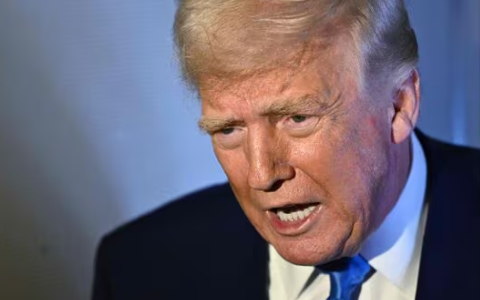Washington (Web Desk/Agencies): US President Donald Trump reaffirmed his commitment to imposing sweeping global tariffs, describing them as essential "medicine" to fix trade imbalances, even as the world’s financial markets struggled amid growing economic uncertainty. Speaking aboard Air Force One, Trump dismissed worries about a potential recession and the deepening turmoil in global markets, saying, “Sometimes you have to take medicine to fix something.”
This declaration came after a weekend of financial market chaos, with global stock prices plummeting and investors expressing fears of a broader economic downturn. US stock futures saw another decline Sunday night, with the S&P 500 falling 2.5% and the Nasdaq shedding over 3%. Asian markets were hit hard at Monday’s opening, led by a 9.4% drop in Hong Kong’s Hang Seng Index and a near 8% decline in Japan’s Nikkei 225. The Shanghai Composite Index was down more than 6%.
The tariffs, set to take effect this week, impose additional duties on imports from both US allies and rivals. Countries like Israel, Vietnam, and Italy have raised concerns, with their leaders expected to push for exemptions or negotiations. Trump noted, “I spoke to a lot of leaders... They’re dying to make a deal,” adding that the US would no longer tolerate trade deficits.
Trump's economic team defended the tariffs on several Sunday talk shows. Treasury Secretary Scott Bessent argued that tariffs were essential to confronting unfair trade practices, while White House adviser Kevin Hassett claimed that more than 50 countries had reached out to begin talks. Commerce Secretary Howard Lutnick emphasized that the tariffs would go ahead, calling them “a long-overdue correction to the global trade order.” “The tariffs are coming. Of course they are,” he affirmed.
The administration’s approach has garnered attention in Congress, with both support and criticism from lawmakers. Some Republicans back the president’s stance, while others are pushing for new legislation to restore congressional oversight over trade policy.
A new bill would require the White House to seek approval for any new tariffs within 60 days. Republican Rep. Don Bacon, in particular, voiced concerns, saying the shift of trade powers to the executive branch may have been “a mistake.”
In a surprising move, Elon Musk, Trump’s cost-cutting czar, suggested a “zero-tariff situation” between the US and Europe, drawing criticism from Trump adviser Peter Navarro, who accused Musk of prioritizing his personal business interests. Trump quickly dismissed Musk’s suggestion, stating that there would be “no talk unless they pay us a lot of money on a yearly basis,” particularly from the EU.
As markets brace for the implementation of the tariffs on Wednesday, the administration has acknowledged the potential long-term economic consequences but remains steadfast in its position.
“There doesn’t have to be a recession,” Bessent said. “What we are looking at is building the long-term economic fundamentals for prosperity.”


